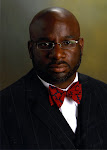
(The photo depicts members of the 1868 General Conference. These were contemporaries of Jesse W. Devine and it is possible that he is in the picture.)
When I accepted my call to preach some 20 years ago (time really flies!), one of the first questions people began to ask was, “Are you the first preacher in your family?” As far as I knew, I was the first. However, my late grandmother Iowa Milan put the record straight (somewhat). She informed me that sometime in the late 1800s, one of my ancestors had also been a preacher in the
Over the past 20 years, I have periodically searched the records of the
But I followed the lead, anyway and what I discovered blew my mind. It turns out that this in fact, was the relative that had come down through family lore. Jesse Devine (which was often misspelled Divine, even in US Census records) was in fact the father of Joe Devine. Joe was the father of Hattie Devine, who was the mother of Georgia Moore, who was the mother of Iowa Milan, my maternal grandmother. It turns out that Jesse W. Devine was a mulatto, which might account for the description of his being a Native American. He also served as the pastor of the Monticello Circuit from 1874 until his death in 1876, which might account for the story that he was Presiding Elder.
Jesse W. Devine was born in
He served as the pastor of the
Jesse Devine also found himself mixed up in the world of national politics. He served as an election official during the controversial election of 1870. During that election, allegations were made that John Edwards (can you believe it?), the Democrat who won the seat in the House of Representatives, had stolen the election by way of voter fraud. It was alleged by the loser, Republican Thomas Bowles, that Black voters had been illegally disenfranchised at the polls. Jesse’s depositions are found among the records in this case. When the dust settled, the courts agreed that Mr. Edwards had stolen the election and the seat was given to the rightful winner, Mr. Bowles.
This is a great story and it may provoke some to question why it would make me weep. But the reason why I wept was two-fold.
First, I wept because of the joy of finding a long, lost relative. At a certain point, I realized that this was not just some scholarly, academic pursuit or just another part of my research agenda. It was personal, deeply personal. As I read through the pages of the Christian Recorder articles that mentioned the various activities he did during his day, I came across his own words. It was just a thank you note, showing his appreciation for the way in which his congregation had taken care of Mrs. Devine. But when I “heard” his voice, it touched me in such a way that the tears were uncontrollable.
But the second reason that I wept was not so joyful. I wept because of the pain in knowing that somewhere along the way, we dropped the ball. Somewhere, we stopped telling this story. No “White man” did that to us, we did that to ourselves. We somehow arrived at a point where the only thing we could say about our roots in



